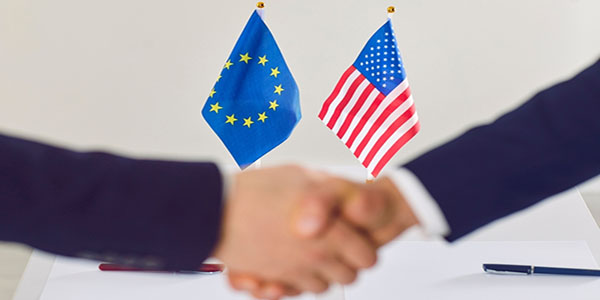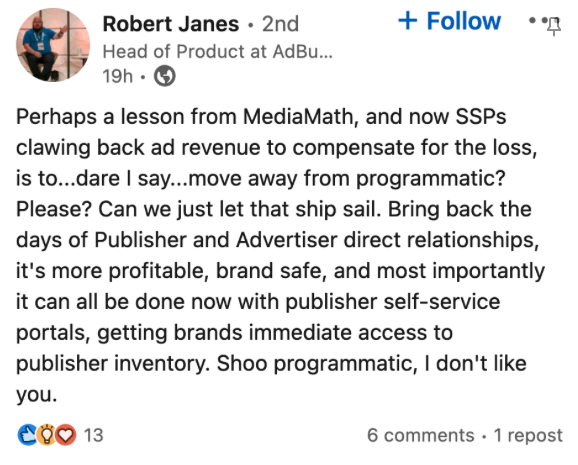 |
||||||||||||
|
||||||||||||
| Sequential Liability: Case by Case Risk |
| The News: Sequential liability is again in the news, with many questioning how much it benefits the digital ad tech space. Sequential liability dictates who assumes the risk if a player goes bankrupt. This week, AdExchanger reported that multiple SSPs are leaning on the sequential liability clauses in their contracts to claw back from publishers the money they lost when MediaMath went belly up. The sums cited aren't insignificant. According to AdExchanger, Magnite is owed $12.6 million, and PubMatic is owed $10.5 million. While SSPs with sequential liability in their contracts have every legal right to clawback money, it's not a strategy with wide support within the industry. According to a 2021 MediaPost survey, just 14% of ad executives believe it's the right approach for handling responsibility when a company like MediaMath goes bankrupt. Only 9% said that publishers should "eat the loss." "Sequential liability is an ad tech tax that burdens the entire supply chain," Scott Messer, Founder of Messer Media. "For me, it was always a top priority in contracts, but it depended greatly on the leverage in each negotiation. As the topic has become more popular and repercussions clarified, I think we'll see much less flexibility on payment terms across the board. Missteps here can have disastrous results." |
|
People may not like it, but it's here to stay as an ad tech tax. Eliminating sequential advertising from the ecosystem will require publishers to band together to refuse to work with any SSP that offers it — an unlikely scenario. "No single publisher has enough scale to make an SSP take that out of their contract. The SSPs will keep sequential liability protection for themselves as long as possible. I highly doubt any significant volume of publishers will stop doing business with PubMatic, Magnite, TripleLift, Wunderkind, the SSPs that have clawed back," said Justin Wohl, Chief Revenue Officer at Salon.
|
| Ad Tech Prepares to Play in Google’s Privacy Sandbox |
 |
| Much like when Beyoncé dropped her surprise self-titled album in 2013, the ad tech world stopped when Google announced plans to deprecate the third-party cookie. World Stop…Carry On: The ad tech industry entered a frenzy when they realized the third-party cookie safety blanket was being pulled from under them. Firefox and Safari let the third-party cookie go a while ago, but Google owns a 65% share of worldwide web traffic, which is a massive blow to publishers and advertisers. Amid the announcement, Google also soft-launched its Privacy Sandbox initiative. The tech titan delayed both on multiple occasions, but the time for waiting is over. Google is rolling out the first phase of the Privacy Sandbox API. America Has A Problem…And Its Third-Party Cookies: This week, Google will enable Privacy Sandbox APIs for about 35% of Chrome users. The percentage will rise to 60% by August and about 99% by the end of the year. Topics API enables Chrome to share information with third parties, such as advertisers, while maintaining a certain level of user privacy. "Topics are a signal to help ad tech platforms select relevant ads," said developer relations engineer Adriana Jara. "Unlike third-party cookies, this information is shared without revealing further information about the user or their browsing activity." |
| Attention all publishers! The time to start testing Google's Topics APIs or any other cookieless solution is now. At AdMonsters Ops NY conference, Joey Trotz, Director of Google's Privacy Sandbox, surprised the audience when he announced that Google would deprecate third-party cookies in Chrome in H2 of 2024 in accordance with their CMA commitments. Paul Bannister, Chief Strategy Officer at Raptive, also emphasized the importance of raising red flags and providing valuable feedback about what works and what needs improvement when testing. "Publishers that start testing the Privacy Sandbox APIs now will also be in a better position when third-party cookies are gone," Trotz said. "I guarantee you're not going to drop in Topics on July 1, 2024, and have your revenue be what you want it to be without a cookie." |
|
| US and EU Launch New Data Privacy Framework |
 |
| The U.S. and E.U. collaborated on bridging the privacy gap, but is the resulting framework enough to help publishers and advertisers sift through compliance confusion? In response to mounting concerns over data privacy and the transfer of personal information between the U.S. and the E.U., both parties have reached a crucial agreement, finalizing a new data privacy framework. The Privacy Framework: It aims to align the E.U. 's GDPR and the U.S. data privacy laws, such as the CCPA. The negotiations involved extensive efforts to ensure that protecting individuals' data rights are upheld while facilitating cross-border data transfers essential for transatlantic business operations. It addresses issues like surveillance practices, data access by law enforcement and establishes a new Ombudsperson mechanism. However, there are still challenges to ensure the agreement's implementation and enforcement are effective. For instance:
|
| The U.S. has struggled to create a federal privacy framework. Several states have passed robust privacy laws — Oregon recently passed a comprehensive state compliance law— but the federal government has not had the same luck. At issue is the federal government and the advertising industry aligning on a standard agreement. While both understand the importance of federal data compliance standards, their ideologies differ. Maybe the U.S. and E.U. framework to streamline overseas data traffic can set a precedent for the U.S.? It's possible, but some industry experts are already combating the U.S. and E.U. framework. Privacy activist Max Schrems is calling for a change in U.S. surveillance law. His efforts struck down the previous two frameworks. Is the third time the charm? |
| Around the Water Cooler |
| Elon Musk's Rebranded Twitter Slashes Ad Prices In a bold move to boost advertising accessibility, Elon Musk's rebranded Twitter, um, X platform has implemented significant cuts in ad prices. The decision aims to attract a broader range of advertisers and potentially revolutionize the social media advertising landscape. (WSJ) Netflix Faces Backlash Over AI Product Manager Job Post Netflix received criticism and sparked controversy after posting a job advertisement for an AI Product Manager role. The role has raised ethical concerns about technology and data privacy limits in the entertainment industry amidst the heat from the writer’s strike. (Deadline) FreakOut Strengthens Advertising Security through IAS Brand Safety Integration Asia’s leading ad tech provider, FreakOut, reinforces its dedication to secure advertising practices by partnering with IAS to enhance brand safety. Through this collaboration, advertisers gain access to advanced tools and measures, ensuring their ads appear in brand-safe environments. (Newswires) Xandr Exists the Political Ad Game Come September, Microsft-owned Xandr is bowing out of the political advertising game. The end-to-end platform for buyers and sellers is forbidding election-related content, including fundraising for political candidates, parties and PACs. There will also be restrictions around alchohol, gambling, tobacco and vaping in certain markets. Microsoft-owned Linkedin is also unfriendly to political advertising. With so much fraud and illegitimate advertisers in the political ad space, this could be a trend for the advertising ecosystem. Other big tech companies like Google and Meta have also slammed down the hammer on political advertising in recent years. (MarketingBrew) |
 |
||
|
||
 |
||
|
||
|
|
| @{optoutfooterhtml}@ |







